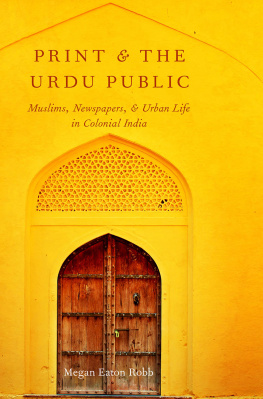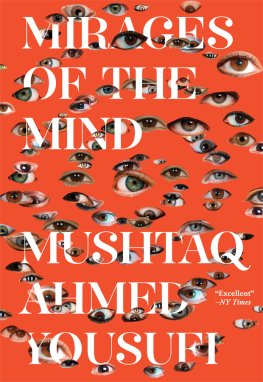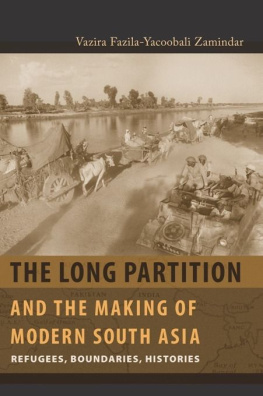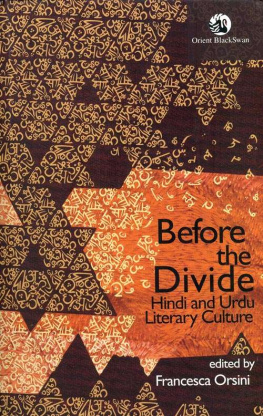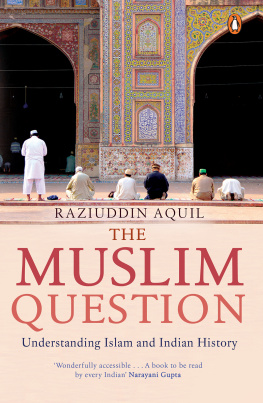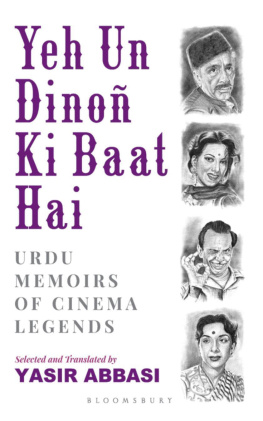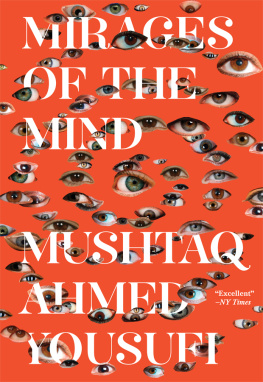Print and the Urdu Public

Oxford University Press is a department of the University of Oxford. It furthers the Universitys objective of excellence in research, scholarship, and education by publishing worldwide. Oxford is a registered trade mark of Oxford University Press in the UK and certain other countries.
Published in the United States of America by Oxford University Press
198 Madison Avenue, New York, NY 10016, United States of America.
Oxford University Press 2021
All rights reserved. No part of this publication may be reproduced, stored in a retrieval system, or transmitted, in any form or by any means, without the prior permission in writing of Oxford University Press, or as expressly permitted by law, by license, or under terms agreed with the appropriate reproduction rights organization. Inquiries concerning reproduction outside the scope of the above should be sent to the Rights Department, Oxford University Press, at the address above.
You must not circulate this work in any other form and you must impose this same condition on any acquirer.
Library of Congress Cataloging-in-Publication Data
Names: Robb, Megan Eaton, author.
Title: Print and the Urdu public : Muslims, newspapers, and urban life in
colonial India / Megan Eaton Robb.
Description: New York : Oxford University Press, 2021. |
Based on the authors dissertation (doctoral)University of Oxford, 2014. |
Includes bibliographical references and index.
Identifiers: LCCN 2020014198 (print) | LCCN 2020014199 (ebook) |
ISBN 9780190089375 (hardback) | ISBN 9780190089399 (epub)
Subjects: LCSH: Madnah (Bijnor, India) |
PressIndiaBijnorHistory20th century. |
Urdu newspapersIndiaBijnorHistory20th century. |
Islamic pressIndiaBijnorHistory20th century. |
JournalismSocial aspectsIndiaBijnorHistory20th century. |
MuslimsPress coverageIndia. | IslamPress coverageIndia.
Classification: LCC PN5379.B55 M347 2020 (print) |
LCC PN5379.B55 (ebook) | DDC 079/.542dc23
LC record available at https://lccn.loc.gov/2020014198
LC ebook record available at https://lccn.loc.gov/2020014199
Dedicated to Aiman, Ashel, Asna, and Ella,
who would be good friends
Contents
This book had its origins in a dissertation project begun at the University of Oxford in 2010 and completed in 2014. The dissertation focused on a single decade of Madnah newspaper and its relevance to the period from the Balkan Wars to the end of the Khilafat Movement. Since 2017 I have approached this project anew to explore the relevance of small-town printing on the wider world.
First and foremost I am indebted to my dissertation supervisor, Francis Robinson, who has remained generous with his time, patience, and resources over the past nine years of work on this project. In the same way, I am particularly thankful to my dissertation supervisor Rosalind OHanlon for her incisive critiques and sympathetic encouragement over the past decade. I seek to emulate the model of intellectual generosity they put forward. I have benefited from the guidance of many invaluable mentors, among them Justin Jones, Margrit Pernau, Faisal Devji, Muhammad Talib, Muhammad Akram Nadwi, Farhan Nizami, Nandini Guptu, and Maria Misra, all of whom contributed to the development of the book. I am also grateful to the many friends who offered me valuable support and insightful comments as I presented parts of this book at conferences over the years: Sneha Krishnan, Faridah Zaman, Jennifer Dubrow, Richard David Williams, Layli Uddin, Eve Tignol, Rinchan Mirza, Muhammad Ali Khan Mahmudabad, and Elizabeth Chatterjee, who gave me feedback on parts of the book.
The process of rewriting the project began four years ago after my arrival at the University of Pennsylvania, where I have benefited from colleagues who supported my writing and enriched the argument of my book. I especially appreciate comments made by Jamal Elias, Lisa Mitchell, Karen Redrobe, Ramya Sreenivasan, Heather Sharkey, Donovan Schaefer, Reyhan Durmaz, and Greg Goulding. I am grateful to the Workshop on Material Texts at the University of Pennsylvania for inviting me to present on this book; their insightful questions gave me a broader perspective of the significance of Urdu journalism production processes.
Tasneem Khan and Ahtesham Ahmad Khan merit special mention for the countless hours they spent reading Madnah with me between 2008 and 2018, in Oxford and in Lucknow respectively. I am also grateful to Imre Bangha, SherAli Tareen, Shehnaz Ahmad, Zeba Parveen, Ismail Mathari Porkundil, and Basharat Husain for their guidance in learning to interpret Urdu primary sources. I also want to thank Abdussaboor Nadwi, instructor at Nadwat-ul Ulama, Lucknow, for simultaneously reading Madnah with me and refining my Urdu during my year of residence in Lucknow from 2011 to 2012. Mustafa Menai generously worked with me to revise all translations of Madnah for this volume in the summer of 2019. Any errors in translation or interpretation are my own.
Many offered me invaluable guidance during my archival work in India and became friends in the processI am grateful to Paramjeet Cheema, Ram Advani, Seema Alavi, Mohsin Ali, Maulwi Nur ul-Hasan Rasheed, Parvez dil and Muneer Akhtar for their hospitality and guidance. Emma Young applied her fine editors eye to the manuscript, her feedback improving the manuscripts coherence. Shiny Das, Theo Calderara, and Macey Fairchild at Oxford University Press shepherded the manuscript through the editing and proofing process with care and facility. I am grateful to the anonymous peer reviewers whose insightful questions and perceptive comments strengthened the final product. I presented versions of book chapters at the University of Oxford, University of Pennsylvania, and University of South Carolina, and at the Annual Conference on South Asia in Madison, Wisconsin, and the Annual Conference for the Association for Asian Studies, where constructive critiques enriched the argument.
I completed research for this book with the support of grants from Indiana Universitys Palmer-Brandon Prize, Oxford Universitys Clarendon Fund, The Wolfson Graduate Scholarship Fund, The Grimstone Travel Fund, the New College Ludwig Humanities Fund Grant, a grant from the Wolfson South Asia Research Cluster, and a US Department of Education Fellowship to attend the American Institute of Indian Studies Urdu language program. I have also benefited from an appointment to the Society of Fellows in Critical Bibliography, which gave me access to instruction on typesetting, lithography, and typography. My work also benefited from a postdoctoral position at the Oxford Center for Islamic Studies and a lectureship at the Oriental Institute at the University of Oxford, both held following the completion of my dissertation. The process of revising the dissertation into a book was supported by the Julie and Martin Franklin endowed Assistant Professorship at the University of Pennsylvania and the Research Opportunity Grant at the University of Pennsylvania, where I have worked for the past four years. I am grateful to the library staff at the University of Pennsylvania, the British Library, the National Archives of India, the Uttar Pradesh State Archives, the U.S. Library of Congress, Raza Rampur Library, and University of London, Royal Holloway.
To my Grandmother Katherine Chaudhri, my Grandmama Sara Shelton, my mother Debbie Robb, my father Mike Robb, and my sister Kate Allman, I am thankful for your unconditional love and support. To Simi Appa, thank you for welcoming me into your heart and home in Lucknow; your generosity has made that city into another homeland. To my husband, Terry, I owe the greatest appreciation for his constant affection, strength, and steadfastness, which has enabled us to make a home wherever we are and wherever we may go.

